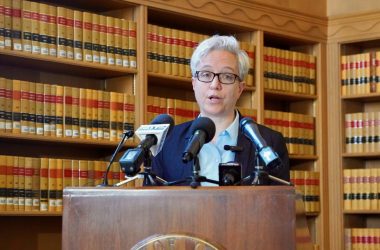Oregon House Republicans have a new leader, and he said he’s focused on uniting his party and finding pragmatic solutions to the state’s problems.
House Republicans chose Rep. Jeff Helfrich, R-Hood River, in a private election last week after former leader Vikki Breese-Iverson, R-Prineville, stepped down. Helfrich, who’s serving his first full term in the House, told the Capital Chronicle he didn’t consider serving in leadership until other Republicans suggested it.
“I want to lead, but I’m a servant leader,” he said. “I’m here to work with you and get our ideas across the finish line, whatever those agenda ideas may be.”
Helfrich, a retired Portland police officer who served in the Air Force during the First Gulf War, represents one of the most competitive districts in the Legislature. (He insists the 52nd House District is also Oregon’s best, given that it’s home to Mount Hood, Multnomah Falls and the Columbia River Gorge.)
He was first appointed to the House to fill a vacancy in 2017, then lost to former Democratic Rep. Anna Williams in 2018. He lost a 2020 rematch with Williams by fewer than 100 votes, then defeated Democrat Darcy Long in 2022 after Williams chose not to run again, citing low legislative pay. Helfrich already has a Democratic challenger in Nick Walden Poublon, the former vice chair of the Clackamas County Democrats.
Republicans hold 25 of the 60 seats in the House, meaning they need to work with Democrats to pass any bills. Helfrich cited his experience as vice chair of the House Housing and Homelessness Committee as examples of how he’s able to work in a system controlled by Democrats.
Most Republicans voted for House Bill 2001 and House Bill 5019, the $210 million housing and homelessness investment he helped craft. He also brought Republicans along to vote for another housing bill that ultimately failed because of Democratic opposition in the Senate.
He said he learned from past Republican leaders, including Breese-Iverson and former Reps. Mike McLane, who led the caucus until 2019, and Christine Drazan, who was in charge from 2019-21.
“All of them had really different leadership styles and abilities to communicate a message and how they went about their business, and they had some blind spots or areas that they maybe could have improved upon,” he said. “I always look in retrospect, how can I improve myself? So I took different ideas from each of those leadership styles and applied that, and that’s how I’m gonna move forward in my role.”
He wants to continue what appeared to be a productive working relationship between Breese-Iverson and House Speaker Dan Rayfield, D-Corvallis, and he said he’s already had candid conversations with House Majority Leader Julie Fahey, D-Eugene.
“We want to get Oregon in the right direction, and we have different ideas and views on how to get there, but we can get there,” Helfrich said. “But we have to have a conversation. And if you’re not sitting at the table, you don’t get the opportunity to have that conversation.”
But while he’s working with Democrats on bipartisan policies, he said he’ll also spend the next year communicating with Oregonians about why they should elect more Republicans. Oregonians have choices, he said, and it’s clear they’re not happy with some consequences of Democratic leadership.
Divergent views
Helfrich beat out Rep. Shelly Boshart Davis, R-Albany, in a private vote the House Republican caucus held Tuesday night. Boshart Davis was the deputy minority leader until the end of the legislative session, when she and Rep. E. Werner Reschke, R-Klamath Falls, abruptly resigned their leadership positions amid heated debates over how House Republicans should handle a final vote on a controversial bill on abortion and gender-affirming care.
Senate Republicans walked out for six weeks to block a vote, and House Republicans were under immense pressure to do the same. Boshart Davis and Reschke were among nearly a dozen House Republicans who stayed away from the Capitol in protest, while Helfrich and Breese-Iverson stayed and voted against the bill.
Helfrich didn’t rule out the possibility of leading his caucus in a walkout and shutting down legislative action, a tool Republican leaders have turned to increasingly in recent years. He wasn’t in office when House Republicans walked out in 2020 and 2021, and he said he doesn’t know what it would take to decide to walk away from the Capitol in protest.
“It’s not just me, if we’re walking out or not walking out,” he said. “It’s the membership. It’s up to them as a caucus as a whole, and we have no information at this point what that would look like or if we’d even do something like that, because there’s nothing to talk about us walking out on.”
Senate Republicans walked out for six weeks to block votes on controversial abortion and gun control bills and over what they described as a protest over the Legislature’s lack of transparency. In recent years, House or Senate Republicans have also walked out to protest new electoral maps, climate change legislation, taxes, COVID restrictions and the Legislature’s quickness in passing bills.
Voters sought to discourage walkouts by passing a constitutional amendment last year barring any lawmaker with 10 or more unexcused absences from serving another term, and Senate Republicans who participated in the six-week walkout are suing to block that law. Legislative Democrats have also floated the idea of changing the state’s quorum requirements, as Oregon is one of only four states that require two-thirds of lawmakers to be present to conduct business.
Gov. Tina Kotek planned to meet with Helfrich, House Speaker Dan Rayfield, Senate President Rob Wagner and Senate Republican Leader Tim Knopp on Thursday afternoon to discuss their expectations for the upcoming legislative session and how to work together on bipartisan priorities like the state’s housing crisis. Kotek congratulated Helfrich at a reception she and her wife hosted for legislators at the governor’s mansion on Wednesday night.
“I’m looking forward to working with him, and I want to commend Leader Breese-Iverson,” Kotek said. “She’s trying to make sure there’s a good transition. It’s hard to become a leader as you’re getting ready for a short session, so I think there’s a lot of effort right now for everybody to work together well and my job is to support that.”
Breese-Iverson said in a statement that she was excited for the future of Republicans in Oregon with Helfrich and newly elected Deputy Leader Mark Owens, R-Crane, and Whip Kim Wallan, R-Medford.
All three new House Republican leaders have worked effectively with Democrats on major issues. Wallan was the caucus’s lead on semiconductors, serving as co-vice chair of a joint committee and playing a major role in crafting the state’s $500 million in loans, grants and tax credits to grow the semiconductor industry. Owens works closely with Rep. Ken Helm, D-Beaverton, on water policy, including a $110 million drought relief package passed this year.
“Each of these representatives hail from different regions of the state and will represent us well in leadership,” Breese-Iverson said. “I am confident in Leader Helfrich’s ability to continue advocating for the interests of all Oregonians and look forward to his thoughtful leadership of our caucus moving forward.”
Oregon Capital Chronicle is part of States Newsroom, a network of news bureaus supported by grants and a coalition of donors as a 501c(3) public charity. Oregon Capital Chronicle maintains editorial independence. Contact [email protected]. Follow Oregon Capital Chronicle on Facebook and Twitter.




